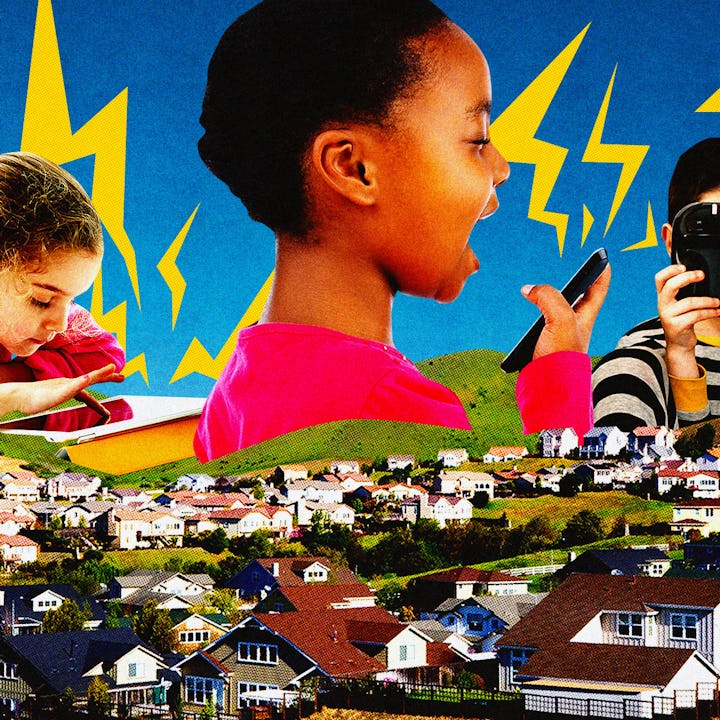Is Anybody Else Getting Tired Of Listening To Their Kids On Speakerphone?
Our kid’s favorite games are broadcasting to every family in town. What does that mean for our privacy?

When I was a kid making a call to a friend, I stretched that long curly cord all the way around the corner onto the top basement steps for some privacy. My mom could stretch it under her bedroom door to talk privately to her real estate clients. Twisting and untwisting that cord was how I passed the time chatting to friends about my day and making plans. Once we upgraded to a cordless phone, I could hole up anywhere in the house away from my parents (and younger brothers). It was glorious. Whereas, I abhorred my family overhearing me talk to my friends, but my kids have no such boundaries.
It’s a common scene in my house: one of my four kids plop themselves down right in the middle of the living room floor with an iPad and pings a friend for gaming. The friend clatters to the call, often sounding like they are tripping over everything in their house while they get ready to play. If you’re not to this phase of life yet, it may sound strange. But trust me, kids today don’t play video games alone anymore. And little kids, in the 8 to 10 age range, game in group calls where everyone signs into a server of a game like Roblox and they play together with multiple friends.
Everything is on speaker — for all the households to hear. Seriously, I can hear it all — dogs barking, siblings fighting, parents yelling to get off screens — and I know other households can hear me, too. I find myself worried about times I take a harsher tone in the battle to get my tween out of bed or the frantic sound of my voice when we’re almost late but can’t find one shoe, because everyone at their house can hear me too. (If I can hear the mom down the block yelling at her crew to JUST PICK UP THEIR SOCKS, she surely can hear me lecturing my kids once more about making sure the freezer drawer is actually closed. (The rubber seal has to actually touch the frame, kids.)
It’s not just when they’re gaming, either. In the chaotic mornings before school as I rush to get four kids out the door in cleanish clothes before my caffeine kicks in, my tween daughter walks around with her best friend on FaceTime. They aren’t even talking. They brush their teeth, eat their breakfast, and choose their outfits through the companionship of a video call.
You might be saying to yourself, What about headphones, though? I’ve bought many pairs. They’re lost, broken, not charged, “hurt my face,” or they chewed on the cord (why do they do this? it’s a mystery) until the sound is crackly. The bottom line is my kids, and most of the other kids I know, are not about that headphone life. They’re living out loud and they have no concept of living any other way.
At least we aren’t alone. Not only do I hear it happening in other homes virtually as I go about my day, I see it in public. When I work remotely from coffee shops or cruise the mall with my kids, it seems out-loud video calls are the norm now and I am a middle aged mom struggling to adjust to the present day. In some ways, it’s made me more cognizant of how I talk to my kids and how it might be heard by others. That’s not a bad thing. It’s also normalized a lot of the chaos that occurs in our busy house with four elementary-aged kids. It may feel loud and overwhelming to us, but at least other houses around our town sound the same sometimes.
One plus? I love that my kids seemingly feel comfortable with us knowing their friends and being a part of our home life. Kids regularly walk in and out our front door in our neighborhood. They pop in for a popsicle, a glass of water, or some sidewalk chalk. This was what I always wanted as a mom, to be the hangout house. I just didn’t expect it to occur virtually, too — but I can adapt.
Meg St-Esprit, M. Ed., is a journalist and essayist based in Pittsburgh, PA. She’s a mom to four kids via adoption as well as a twin mom. She loves to write about parenting, education, trends, and the general hilarity of raising little people.